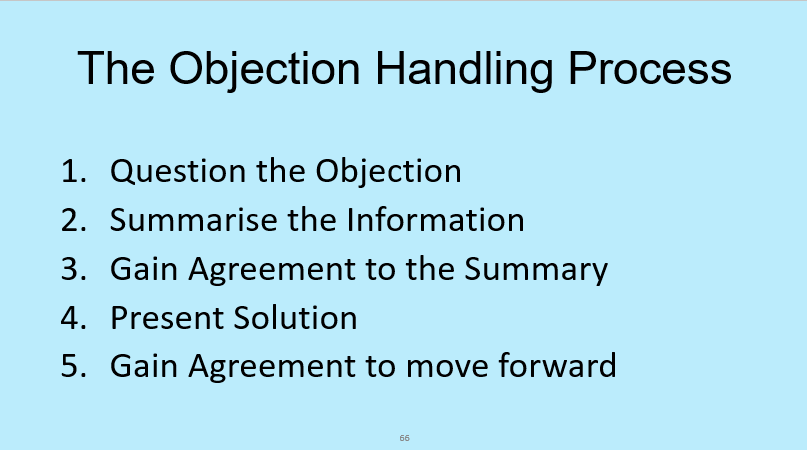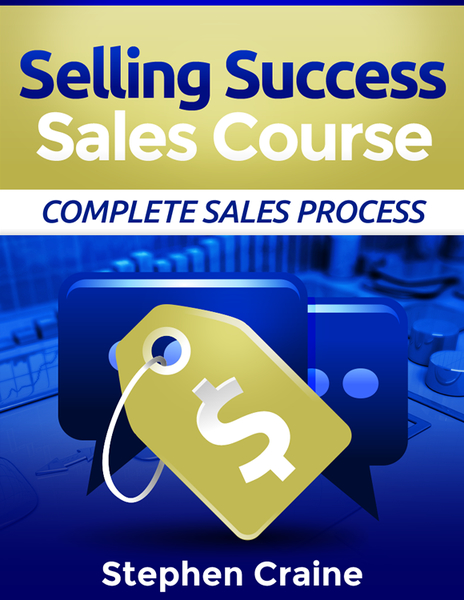Handling Price Objections
AND THE REAL REASONS WE GET THEM
Overcome common sales objections on price and get more customers and clients
Handling price objections with confidence and overcoming this common sales objection means you can close sales you would otherwise lose, get more customers and clients, and maximise your income to achieve you personal goals.
Why prospects raise price objections
Customers object to price for 3 main reasons:
1. Comparing your product and price to others.
2. Their expectations about the price.
3. Beliefs about the cost and value.
When you understand the reasons prospects raise objections such as: It's too expensive... handling price objections becomes a lot easier.
The sales training here will sow you how to define the beliefs prospects have and the evidence that supports their sales objections, and target your response directly at destabilising those beliefs.
The customer may simply say: The price is too expensive.
That simple statement can have so many different meanings.
Some of them real, some a smoke screen, some come from the prospect's beliefs, some from previous experience and some are a behaviour pattern they think they should follow as a buyer. Objections to price can be real concerns or false smoke screen objections, and for unreal smoke screen objections you have to find the real objection and its cause before you can overcome it.
When handling price objections effectively you have to get to the real reasons, the beliefs, and the past experiences that support them. So here are 3 common reasons behind price objections, then we will look at how to handle the price objections.
Why We Get Sales Objections to Price
Price comparison to other products
The prospect compares your product to a cheaper one that they assume has similar features and value for them, and will give them the same result as the offer you are presenting at a higher cost.
If the other product they are comparing has less features and benefits, then handling price objections is done by showing the buyer that the evidence supporting their beliefs and the objection is false.
If the sale is for a service, the cheap competition may have hidden cost that are not given in the advertised price. This happens often in B2B sales where there is a monthly or weekly service charge or the cheaper cost offered by competitors could be increased within the terms of the contact once they have signed up.
The buyer may be unaware of the features and benefits included in your price, such as: after sales service, longer guarantees, and the quality of your products. These unknown features may offer money saving benefits such as low maintenance costs, higher efficiency, and a return on investment that can negate the cheaper price of other products.
Another reason buyers compare your products and services to others and raise the price objection can be misleading advertisements and marketing. Be aware of your competitor’s claims in their literature and adverts when handling price objections and have evidence ready that will challenge them.
Expectations on pricing
Some buyers will have an expectation about what the price of the offer you are presenting should cost. If your price is higher than their beliefs on what it should be you will get the Too Expensive sales objection.
Their expectations are based on their beliefs and past experiences. A common sales objection reason is based on costs of previous, similar purchases made in the past. Inflation, price increases, manufacturing costs, and additional features may have caused the price to increase and their expectations are now out of date. To overcome the price objection you have to address the evidence they are using to support their expectations on price.
Discover where the objection is based on their map of reality
There is no point hammering on with a response to their objection that tells them how good your product is, how many benefits they will get, or how nice it looks. That is not where their objection is based.
On their internal map of reality their objection is based on their beliefs and experience. When handling price objections, discover what that experience was, and when it happened, and what is creating their beliefs and expectations on price.
A belief they can get a cheaper price
Some buyer’s, in both B2B and B2C direct sales markets, believe all sales people can give them a lower price if pushed.
Some even distrust sales people and think they are looking for a quick sale at a high price so they make more commission.
These beliefs are where their sales objection sits, and it's the beliefs that you have to discover and destabilise if you are going to overcome the price objection and deal with a prospect that wants to haggle over price.
In some cultures you have to handle price objections because it is standard practice to haggle. Customers want to know they have got the best price possible and use price objections as a way of doing this.
Then there are objections based on budgets and available money. Businesses have planned budgets and people have an idea of what they can afford, but what they can afford is not related to the price you need to charge for your products to make a profit. This type of objection is based on them relating what they can afford to your price, and that is a false assumption.
All these reasons for objections can stop your sale and you need to be able to identify them and overcome the real objections. To do this you follow a simple sales objection process...
Handling Price Objections
A Simple Proven Process to Close More Sales
While training and managing corporate sales and telesales teams, I developed a simple 5 step sales objection process. This works when handling price objections as well as all other types of objections.
You can see a full section of sales training on this process at Sales Objection Process
The first step is to define the objection, discover what information and previous experience has led to the creation of the beliefs they hold and the price objection. To do this you ask questions.
Summarise the information and gain agreement
Summarise the information you discover and make sure there are no more objections lurking. You gain agreement to your summary, you're just checking you understand their objection and the thought process supporting it.
Present your response
Present your response, your best answer, the solution, and destabilise and knock down the evidence behind the prospect's beliefs. Once you have found the beliefs and evidence that the objection to price is based on you can take them away and the objection loses all support and crumbles.
Gain agreement to your answer
Ask the question, gain agreement that you have answered the objection. What you have really done is change the prospect's beliefs and expectations on pricing.
If the objection was raised after your sales presentation, and you gained agreement that there were no other sales objections, agreement you have answered the objection could mean you can now close the sale.
See below for ideas on presenting your response when handling price objections...
Sales Training on Presenting Responses
When Handling Price Objections
When handling price objections, present answers that target the real objection from the prospect's perspective. Aim the first part of your answer at knocking down the beliefs causing the objection, then use positive benefits about your sales offer to build value into your price. It’s not enough to show the negatives about the price objections and why they are wrong. You have taken away their objection now replace it with positive benefits that you can offer.
Here are some ideas on presenting the best objection response...
Price comparison
Discover what the prospect is comparing, what frame of reference are they using to base their compared price on. Look at the differences and the additional value they will get from your offer compared to the one they are using for comparison. There are very few products that you cannot buy a cheaper version of, and there are many reasons to buy what at first can appear to be the more expensive options, find the reasons prospects should buy yours.
Price expectations
Similar to handling price objections based on a comparison, first discover where the expectations have come from, then address that information and show why it is incorrect. Then build the value of your offer and show the features and benefits that will support the price you are offering.
A really good technique when handling price objections is to list the cost incurred by your business when manufacturing or providing a product or service.
Try this sales training exercise:
List all the direct costs associated with your sales offer: manufacturing costs, shipping, man-hours for service provision, delivery costs, packaging, and any others.
Add them up and see how they compare to the final price to the customer. If the figures are reasonable business margins and you decide to use this figure and show it to prospects to handle price objections, remind them that these are only direct costs. In addition to this there are the costs of running the business, administration costs, premises, facilities, utilities. etc.
You can use the figures in 2 ways:
- You can show that, with the price you are charging your business is only making the reasonable, and expected margins that any business needs to achieve to continue trading.
- You can use the figures to show that, if your competitors are charging less they must be cutting corners somewhere, because if they were providing a product or service of similar quality they would incur similar costs and would need to have similar pricing. If you can find out why your competitors are able to cut prices, even better.
Add these ideas to the Sales Objection Handling Process and overcome more objections to price. This will maximise your sales and earnings from the prospect you meet with or call, grow your earnings and your business, and give you real sales career security.
The Selling Success Sales Training Course
The Full Sales Process and a Complete Section
on Overcoming Sales Objections
Follow the easy to use sales training in this course and Close more sales – Prevent and overcome more sales objections – And build a consistent high level income that will give you the freedom to choose the lifestyle you desire.
Gain real security from sales results you control and eliminate pressure and stress from your sales role.
Selling Success is the sales course i developed while managing and training corporate sales teams.
It's the easiest way for you to create sales scripts for all types of sales calls or meetings whenever you need them. You’ll learn what to say and do at every point of your sales meetings or calls, so you can talk with confidence to prospects.
160 pages of sales training - 20 exercises in a separate workbook - 60 slides to support the training.
And, the course has already been proven successful, so you know it will work for you.
You can download and start using the course today. Learn more about this proven course by visiting: Selling Success
The Sales Buzz - Newsletter Ezine
The weekly Sales Buzz eZine newsletter covers all aspects of sales with a different tip, technique, or discussion point each week.
See the latest pages to be added or updates on the Proven Sales Training website, real examples from the world of sales, and interesting innovations that sales people and businesses are using.
When you ask for the Sales Buzz to be delivered you get 2 free sales training mini-courses that are unique to this website, and we have a strict privacy policy so you know your details are kept safe.
See the 2 free mini-courses and get the Sales Buzz delivered by visiting: The Sales Buzz
- Homepage
- Sales Objections
- Price Objections


